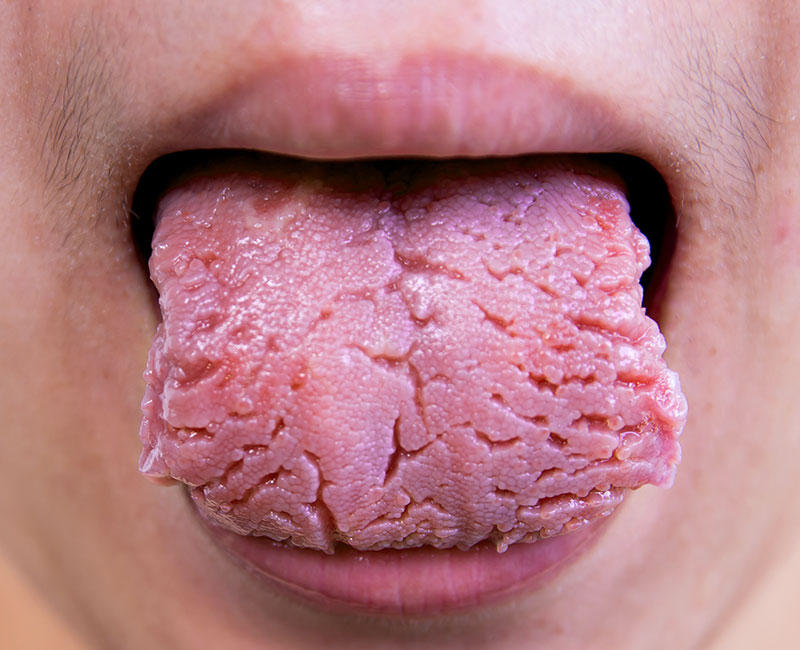A fissured tongue is a benign condition that causes grooves on the surface of your tongue. You’re more likely to have them if you have geographic tongue or a condition like Melkersson-Rosenthal syndrome or Down syndrome. But the fissures themselves are harmless. Good oral hygiene can prevent a fissured tongue from causing issues like bad breath.
Advertisement
Cleveland Clinic is a non-profit academic medical center. Advertising on our site helps support our mission. We do not endorse non-Cleveland Clinic products or services. Policy

Image content: This image is available to view online.
View image online (https://my.clevelandclinic.org/-/scassets/Images/org/health/articles/fissured-tongue)
A fissured tongue is a harmless condition that involves having furrows or grooves on the surface of your tongue. Most tongues are flat and smooth, except for tiny bumps on the surface called papillae. There usually aren’t grooves or fissures.
Advertisement
Cleveland Clinic is a non-profit academic medical center. Advertising on our site helps support our mission. We do not endorse non-Cleveland Clinic products or services. Policy
A tongue that looks different from the norm (or a change in your tongue’s appearance) can signal a problem. But this isn’t the case with a fissured tongue. Your tongue may look different, but it’s just a healthy variation of what counts as normal. It doesn’t mean you have a condition that requires treatment.
Other names for a fissured tongue are lingua plicata, furrowed tongue or scrotal tongue.
It’s tough to say for sure. Depending on the research, anywhere from 2% to 20% of people worldwide have tongue fissures. In the United States, the numbers are closer to 2% to 5%. It can be difficult to track how common tongue fissures are because there aren’t universal guidelines for diagnosis. Also, studies of populations in certain geographic regions show higher instances of tongue fissures than in other regions.
Tongue fissures are slightly more common in males and people older than 50. Researchers aren’t sure why. But it’s possible that the age of diagnosis relates to the aging process; a person may develop deepening grooves with age.
Fissured tongues come in all varieties. The grooves may be as shallow as 2 millimeters or as deep as 6 millimeters. The fissures may make your tongue appear cracked or wrinkly.
Advertisement
When you look at your tongue in the mirror, you may see:
A fissured tongue doesn’t usually cause symptoms unless food or bacteria get trapped in a groove. When this happens, you can develop:
But you can develop these symptoms even without fissures. Keeping the grooves free of bacteria by practicing good oral hygiene can keep you symptom-free.
Experts don’t know what causes a fissured tongue. It’s possible that genetics come into play, as tongue fissures can run in families. This may explain why people in some regions are more likely to have tongue fissures than people in other regions.
Still, more research is needed to know for sure.
Experts do know that people with specific conditions are more likely to have tongue fissures. A fissured tongue is commonly associated with:
But having fissures on your tongue isn’t a warning sign of a condition or health issue. It’s not a sign that you’re missing key nutrients or have a vitamin deficiency. Think of fissures as a harmless characteristic that just happens to occur more frequently alongside certain conditions.
Healthcare providers can tell you have fissures just by looking. Your dentist may notice them during a routine dental cleaning.
You won’t need treatment unless food or bacteria get stuck inside a groove. This can lead to inflammation or an infection that your healthcare provider can treat.
But fissures alone aren’t a problem. As long as you take good care of your teeth, gums and tongue, you won’t need to see a provider.
Fissures on your tongue don’t go away. But the good news is that there’s no reason to get rid of them. Your tongue may look a little different from other people’s tongues if you have fissures. But having a different tongue isn’t the same as having a diseased tongue. You can keep it healthy with good oral hygiene.
If you have tongue fissures, you may need to take extra care to keep the grooves free of food and bacteria. In addition to brushing your teeth (and tongue) twice daily and flossing, you may also need to:
Advertisement
Your dental provider can advise you on steps you need to take daily to keep your tongue clean.
No. Tongue fissures are benign. They’re not a sign of any disease, including cancer. It’s just a less common version of a normal tongue. Having a fissured tongue is as harmless as having an outie (instead of an innie) for a belly button.
It’s never a bad idea to ask your healthcare provider questions about parts of your body that seem unusual to you. Sometimes, what looks strange or atypical is a warning sign of a condition that requires treatment. But when it comes to tongue fissures, the difference is harmless. As long as you’ve got good oral hygiene, the grooves in your tongue shouldn’t give you trouble. If there’s a concern that bacteria may get trapped there, your provider can tell you how to keep your tongue free of debris.
Advertisement

Sign up for our Health Essentials emails for expert guidance on nutrition, fitness, sleep, skin care and more.
Learn more about the Health Library and our editorial process.
Cleveland Clinic’s health articles are based on evidence-backed information and review by medical professionals to ensure accuracy, reliability and up-to-date clinical standards.
Cleveland Clinic’s health articles are based on evidence-backed information and review by medical professionals to ensure accuracy, reliability and up-to-date clinical standards.
Dentistry plays an important role in oral health. Cleveland Clinic’s experts can design a personalized plan that will keep you smiling for the long haul.
